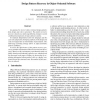Free Online Productivity Tools
i2Speak
i2Symbol
i2OCR
iTex2Img
iWeb2Print
iWeb2Shot
i2Type
iPdf2Split
iPdf2Merge
i2Bopomofo
i2Arabic
i2Style
i2Image
i2PDF
iLatex2Rtf
Sci2ools
104
click to vote
IWPC
1998
IEEE
1998
IEEE
Design Pattern Recovery in Object-Oriented Software
An approach to recover object oriented design patterns from design and code is presented. The pattern recovery process is based on a multi-stage filtering strategy to avoid combinatorial explosion on large software systems. To maintain independence from the language and the case tools adopted in developing software, both design and code are mapped into an intermediate representation. The multi-stage searching strategy allows to safely determine pattern candidates. To assess the effectiveness of the pattern recovery process a portable environment written in Java has been developed. Based on this environment, experimental results on public domain and industrial software were obtained and are discussed in the paper. Evidence is shown that, by exploiting information about method calls as a further constraint beyond the structural ones, the number of false positives is reduced.
IWPC 1998 | Multi-stage Filtering Strategy | Multi-stage Searching Strategy | Pattern Recovery Process | Software Engineering |
Related Content
| Added | 05 Aug 2010 |
| Updated | 05 Aug 2010 |
| Type | Conference |
| Year | 1998 |
| Where | IWPC |
| Authors | Giuliano Antoniol, Roberto Fiutem, L. Cristoforetti |
Comments (0)

